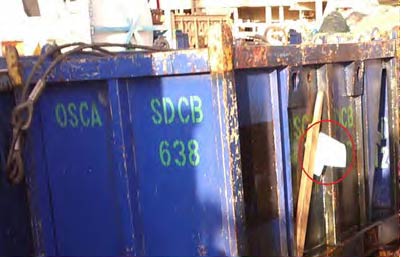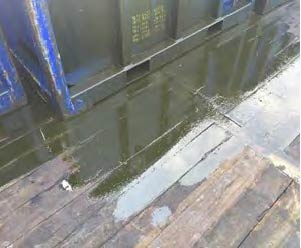Equipment damaged during cargo operations
A member has reported an incident in which a filled drilling cutting box (DCB) was punctured during transfer onto the deck of a supply vessel. The DCB was damaged, with the side being punctured from a protruding angle iron bracket on an adjacent container. The DCB contained sand and an amount of oily water. The supply vessel Master decided to backload the container onto the platform and, upon lifting it, the oily water spilled out from the punctured area. This resulted in a minor spillage onto deck.


Our member noted the following:
- There was inadequate risk assessment for the emergency response to the spillage;
- There was no consideration given to potential release of oily water to the deck prior to backloading;
- Returning the container to the platform was against company procedures which state:”The vessel Master is responsible for the safe and correct loading of his vessel and should liaise with the OIM (client representative on the installation) to ensure that the vessel is loaded correctly. The master should notify the OIM of defective lifts and return these to the installation only if it is safe to do so”;
- No-one stopped the job.
The main lessons identified were:
- The Master has overriding authority to make decisions on the vessel; his action in this particular case, should have been to arrange sealing of the punctured area of the DCB with suitable materials to prevent further spillage to deck;
- Better communications between the Master and platform Offshore Installation Manager (OIM) should have been in in place.
Members may wish to refer to the following incident (search word: cargo):
Safety Event
Published: 18 April 2016
Download: IMCA SF 10/16
IMCA Safety Flashes
Submit a Report
IMCA Safety Flashes summarise key safety matters and incidents, allowing lessons to be more easily learnt for the benefit of all. The effectiveness of the IMCA Safety Flash system depends on Members sharing information and so avoiding repeat incidents. Please consider adding safetyreports@imca-int.com to your internal distribution list for safety alerts or manually submitting information on incidents you consider may be relevant. All information is anonymised or sanitised, as appropriate.
IMCA’s store terms and conditions (https://www.imca-int.com/legal-notices/terms/) apply to all downloads from IMCA’s website, including this document.
IMCA makes every effort to ensure the accuracy and reliability of the data contained in the documents it publishes, but IMCA shall not be liable for any guidance and/or recommendation and/or statement herein contained. The information contained in this document does not fulfil or replace any individual’s or Member's legal, regulatory or other duties or obligations in respect of their operations. Individuals and Members remain solely responsible for the safe, lawful and proper conduct of their operations.
